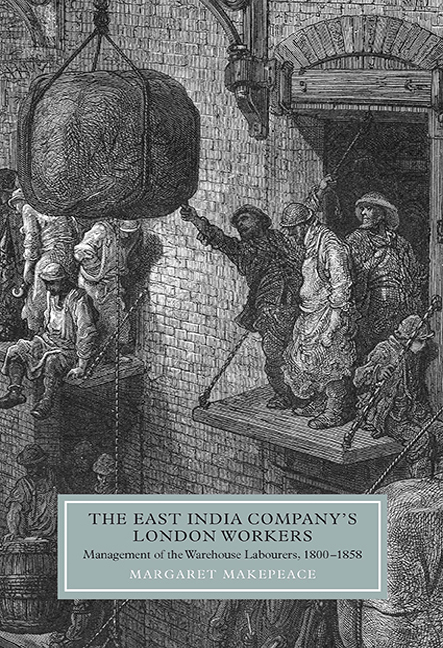Book contents
- Frontmatter
- Contents
- Figures and tables
- Dedication
- Acknowledgements
- Abbreviations
- 1 Introduction
- 2 The East India Company Warehouses
- 3 The Warehouse Labourers
- 4 Management Strategies: Incentives, Rewards and Benevolence
- 5 Management Strategies: Systems of Internal Control
- 6 The Royal East India Volunteers: The ‘Union of Civil and Military Dependence’
- 7 The Relationship Between the East India Company and its London Warehouse Labourers
- 8 The Warehouse Closures
- 9 Management of the Warehouse Labourers and Pensioners 1838–1858
- Conclusion: ‘Good Masters to the Lower Class of Their Dependents’
- Bibliography
- Index
7 - The Relationship Between the East India Company and its London Warehouse Labourers
Published online by Cambridge University Press: 13 April 2017
- Frontmatter
- Contents
- Figures and tables
- Dedication
- Acknowledgements
- Abbreviations
- 1 Introduction
- 2 The East India Company Warehouses
- 3 The Warehouse Labourers
- 4 Management Strategies: Incentives, Rewards and Benevolence
- 5 Management Strategies: Systems of Internal Control
- 6 The Royal East India Volunteers: The ‘Union of Civil and Military Dependence’
- 7 The Relationship Between the East India Company and its London Warehouse Labourers
- 8 The Warehouse Closures
- 9 Management of the Warehouse Labourers and Pensioners 1838–1858
- Conclusion: ‘Good Masters to the Lower Class of Their Dependents’
- Bibliography
- Index
Summary
the late eighteenth-century political economist and reformer Patrick Colquhoun believed that a careful blend of benevolence and coercion could be used to create an authoritarian, but not repressive, framework for social order. The regime established in the microcosm of the East India Company London warehouses was proof that such a concept could be successful, with an intermingling of incentives and constraints used to maintain the organizational hierarchy and to try to create the type of work force wanted by the directors. In contrast, many industrial employers in the early nineteenth century based their dealings with their workers purely on ‘compulsion, force and fear’, whilst Colquhoun spoke of the need for dock labourers to be ‘overawed and controuled’. This chapter will put forward evidence to suggest that the Company succeeded in forging a much less confrontational relationship with its warehouse labourers based largely on mutual loyalty, whereby the labourers were to a degree controlled but certainly not overawed by their managers.
The East India Company's method of directing the warehouses conformed to most of the universal management principles later identified by Henri Fayol (1841–1925). Some of these have already been examined in earlier chapters: a chain of command running from the top to the bottom of the organization; the right of managers to give orders and exact obedience; centralization; order; specialization of labour; remuneration for employees; and stability of tenure for personnel. Fayol also specified: discipline which was grounded in respect rather than fear; equity, or kindliness and justice in employee relations; and esprit de corps. These last three principles are evidenced by the relationships which developed amongst the Company managers and the labourers.
The Company archives reveal that the chain of command within each warehouse was clearly demarcated, with precise gradations within ranks: for example, in 1820 Thomas Proben was a junior deputy assistant elder. Warehouse-keepers, deputy keepers, elders, assistant elders and deputy assistant elders were distinguished by the use of the title ‘Mister’ before their names; the commodores and labourers were referred to by their first names and surnames only.
- Type
- Chapter
- Information
- The East India Company's London WorkersManagement of the Warehouse Labourers, 1800–1858, pp. 140 - 155Publisher: Boydell & BrewerPrint publication year: 2010



